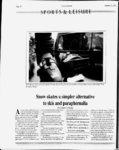| OCR Text |
Show January 5, 1996 Cross Currents Page 8 HEALTH & EDUCATION Champion of brain injury recovery works toward research in the field By Njal Schold a person who has sustained a injury, pursuing a college can be a huge challenge. Watson of Atec is meeting Sherry this challenge as a step toward another: conducting research on recovery front For traumatic brain injury. Like others who are recovering from TBI, the shorthand for traumatic brain injury, Watson faces challenges in learning because of her brain injury in 1982. She was an A grade college student then. Today she takes pride in overcoming difficulties in memory and speed of recall in order to make Bs while pursuing a degree at Fort Lewis College. In a Phoenix rehabilitation center she was taught to walk and swallow again. The effects of brain injury on emotions and their expression, however, arc what she wants to research because of her experience. For the last 0 years she has been involved in the New Mexico and National Head Injury foundations; she was instrumental in helping to establish Interface Rehabilitation Center in Farmington; and she is well known in the rehabilitation community. Now she is pursuing a bachelors degree at Fort Lewis College. Why did she choose to put herself and her family into such a challenge? According to her husband Tracy, She needs to do this to get in the door of the field she wants to pursue. After her injury in 1982 (in an ATV accident) she first was taught to swallow and walk at a Phoenix rehabilitation center. She learned leg lifts, fine motor skill exercises and how to control the muscles required for swallowing. She worked hard to regain these basic activities, but no work was addressed to help her develop emotional connection and expression. Relearning to become socially functional was never addressed. As her physical strength improved, Sherry describes her emotional experience as being unidentifiable feelings L that were, unmistakably, a part of her. Expression was difficult. Her husband, Tracy, became her emotional therapist. He painstakingly helped her to relearn what the social norms of emotional expression are. Her vision of an appropriate rehabilitation program would include emotional training in the first is also doing very well. Her confidence shows as she talks. Returning to college has been a difficult process and has required her, as she says, to relearn how to learn. She She has tried numerous tech- phases of brain injury recovery. Learning how to do this is Sherrys goal. Concerning the current stale of niques and has invented ones to help her study and recall. emotional rehabilitation, Sherry says, psychology now dictates the world of recovery. She wants to research the biological roots of emotions. It is the also faces the same difficulties of juggling time and resources any student with a family faces. The family had to work that she hopes to pioneer with others by pursuing a degree at Fort Lewis College. In the years that followed her recovery, her interest in emotional relearning grew. Her activism as a survivor put her in touch with other survivors and their family members, who reinforced her conviction that there was get organized, says Tracy. One of the most difficult things she has had to do is to ask for special accommodations. She was used to doing for herself and having many people around her who, aware of her brain injury, helped her with any special needs she had. Most people dont realize her disability, and she has been able to mask the residual effects of her injury, but, says her husband, she has ceilinged out on her ability to overcome." According to Sherry, the administration of Fort Lewis College is trying to provide reasonable accommodations, but some professors make her feel like shes been a burden when she asks for more lime or a different accommodation for testing. Things like remembering appointments are difficult enough, but are nothing compared to remembering technical names for an exam. Memorization and spewing out facts during a quiz something not being addressed. She describes her drive to discover the keys to emotional rehab as a burning in my heart to see if theres something to this, something for me. Her position as president of the Survivors Council of the National Head Injury Foundation from 1991 through 1993 brought her in contact with members of the AMA and professionals in the field of neuropsychology. The lack of professional understanding of the need for emotional rehabilitation became apparent to her when, in trying to explain to these professionals what she and other survivors were experiencing, they never really understood what we were talking about, she said. Successfully meeting the challenge of collegifhas added a new dimension to her life. In these past months at Fort Lewis, she has felt more of a failure than she ever has before. Never before in her life has she had to deal with lack of confidence; she is now having to learn how not to give up when she has failures or does poorly on an exam. At the time of her injury, she was a straight-college student and not accustomed to being mediocre, says her husband, Tracy. She puts a lot of pressure on herself. She is realizing that getting Bs A Sherry Watson of Aztec, former president of the Survivor's Council of the National Head Injury Foundation, poses with U.S. Senator Pete Domenici, Republican of New Mexico. Watson, formerly of Farmington, is a student at Fort Lewis College, Durango. (Photo courtesy of Sherry Watson ) omit zirtj jg ygolorl-jz- bif.vot gm |







































